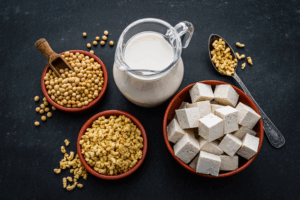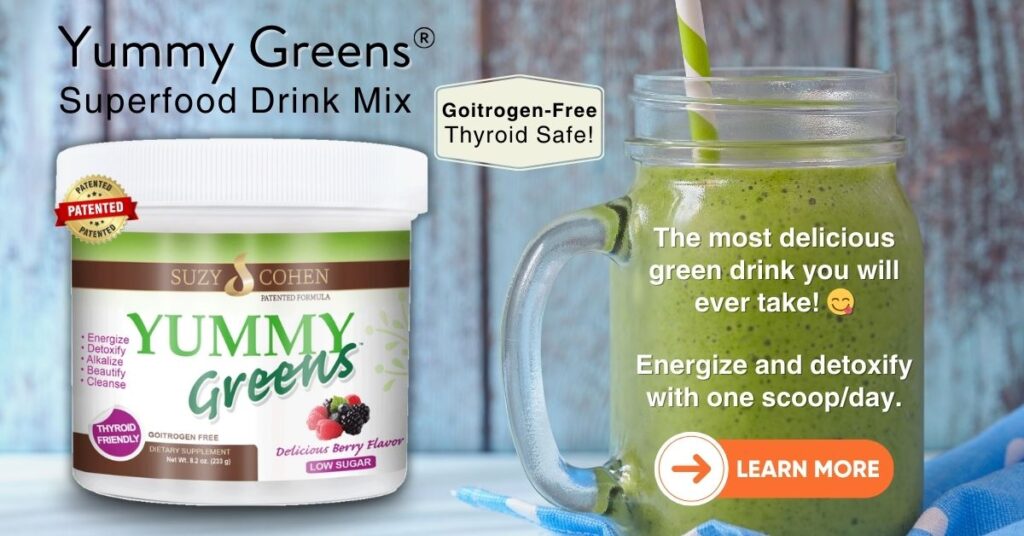What's On This Page?
ToggleUnderstanding goitrogens feels a little like unraveling a dietary mystery. These naturally occurring compounds have earned a scary reputation because they interfere with thyroid function.
Goitrogens get their name from “goiter,” the swelling of the thyroid gland that can happen when this organ isn’t functioning optimally or you’re deficient in iodine. Goitrogens interfere with your ability to absorb iodine, which is required to make thyroid hormones, namely T3 and T4.
Eating too many goitrogenic foods can suppress hormone production. And if you’re already hypothyroid, it could make things worse leaving you fatigued, foggy, gaining weight, losing hair, and depressed. Read THIS article from the National Library of Medicine. Don’t want to read all that? I don’t blame you here’s the cheat sheet for it:
🥔 Surprising Goitrogens:
Cassava, lima beans, sorghum, linseed, and even sweet potatoes break down into thiocyanates, which block iodine from reaching your thyroid.
🥦 Raw Crucifers:
Broccoli, kale, cauliflower, cabbage, and turnips contain glucosinolates that interfere with iodine uptake—especially when eaten raw. Cook them!
🥛 Soy & Millet:
These contain flavonoids that impair thyroid peroxidase – an enzyme your body needs to make thyroid hormones. Sneaky, right?
⚠️ Nutrient Deficiencies That Worsen the Problem
-
Selenium 🧪 – Needed to detox hydrogen peroxide and convert T4 ➡️ T3 (thyroxine to tri-iodothyronine)
-
Iron 💪 – Required for thyroid peroxidase to activate iodine
-
Vitamin A 👁️ – Helps regulate TSH levels from your pituitary
🔄 Bottom Line: It’s not just about avoiding goitrogens. It’s about giving your thyroid the right fuel and cofactors to thrive. This isn’t a one-note problem—it’s a full-body symphony, and balance is everything.
Goitrogens are found in broccoli, cauliflower, kale, Brussels sprouts, peanuts, soy, millet, peaches, strawberries. See the dilemma? These healthy foods are rich in antioxidants and fiber, and cruciferous vegetables in particular may even help fight cancer. So we don’t want to trash them. But we do need to be thoughtful, especially if you have Hashimoto’s, hypothyroidism, or are borderline low on iodine.

What Happens If You Ignore This?
Look, I get it, those glowing green smoothies on Instagram look healthy. The influencers sipping neon green superfood powders in bamboo tumblers seem to have it all figured out. But here’s what nobody tells you: If you keep drinking goitrogen-packed products day after day, especially with raw kale, spinach, soy, or millet you may slowly wear down your thyroid.
The first sign? You crash. You go from supercharged to sluggish over time. You lose that sparkle. Your jeans fit tighter, your hair feels thinner, and maybe you just don’t feel like yourself anymore.
What’s happening behind the scenes is even more concerning: your thyroid may be struggling to produce enough T3 and T4 because goitrogens are quietly blocking iodine uptake. Over time, this can snowball into full-blown hypothyroidism. You might find yourself at the doctor’s office with a prescription for levothyroxine, wondering how this all snuck up on you.
Read this later: Iodine Testing Simplified: Top 6 Iodine Testing Methods Available Now
So if you ignore this and keep chugging down those trendy green drinks thinking they’re helping you—when they’re actually mugging your nutrients—you could wind up with fatigue, brain fog, weight gain, or worse. And the worst part? It was preventable.
There’s no need to name brands or point fingers here. You’ll know them when you read the ingredient label and see raw kale, broccoli powder, or soy isolate near the top. Just because a product is sold at a fancy wellness shop or backed by a celebrity doesn’t mean it’s thyroid-friendly. Be your own advocate.
Here are 3 sneaky ways goitrogens can sabotage thyroid health:
1. Drinking green smoothies with raw kale or spinach
Raw cruciferous and leafy greens are packed with goitrogens. Blending them into smoothies might sound healthy, but the myrosinase enzyme becomes active when these greens are chopped or chewed. That transforms glucosinolates into goitrogenic compounds that block your iodine uptake and suppress hormone production. Daily intake will quietly suppress your thyroid hormones. Take my Yummy Greens instead which is goitrogen-free and thyroid-friendly.
2. Relying on soy-based protein shakes or meat alternatives
Soy contains isoflavones, which can interfere with thyroid peroxidase. That’s the enzyme needed to add iodine to your hormones. People drinking soy protein shakes or eating fake meats (like soy burgers) often don’t realize they’re stressing their thyroid, especially if they’re low on iodine to begin with. Some studies link soy intake to suppressed thyroid activity (especially if you’re low on iodine), but others show little impact. My take? Moderation. Opt for fermented soy like tempeh or natto. And don’t take your thyroid meds near a soy-heavy meal.

If you’re already taking thyroid medication (like levothyroxine (Synthroid) or liothyronine (Cytomel)) the timing matters. Read this: Chronotherapy: Timing of These 7 Medication Matters Greatly!
These meds should always be taken on an empty stomach, away from supplements, calcium, iron, and especially soy. Even healthy smoothies can interfere with absorption if you’re not careful. I tell people to wait at least 3 to 4 hours before consuming any green drinks or meals that might contain goitrogens.
3. Sipping “superfood” green drinks loaded with hidden goitrogens
A lot of store-bought greens powders are filled with dried kale, spinach, broccoli sprouts, or even millet and those can gradually reduce hormone output. It could take a few months for you to notice the energy depletion. Most green drinks are not thyroid-safe in my opinion due to high goitrogen content (read the veggies on the label to see what I mean)!
Why You Might Feel Worse Before You Crash: The Goitrogen High”
Many folks report feeling great (or better) when they first start drinking green smoothies or superfood powders, they notice clear skin, more energy, a clearer brain, faster growing nails and better digestion. That’s because these products often contain adaptogens, B vitamins, or naturally energizing compounds. But hidden within those same drinks? Kale, spinach, soy protein, and other goitrogens that gradually chip away at thyroid function. The “high” turns into a crash as your iodine stores drop and your T3 production takes a hit. This section could explain that false sense of health some people feel before the thyroid suppression sneaks in. It sets the stage for why your goitrogen-free Yummy Greens avoids this trap.
Cooking your veggies can deactivate the enzymes that trigger goitrogenic activity. That’s a good thing. So a quick steam, sauté, or boil can make a huge difference. Fermenting helps too… so if you’re reaching for kimchi or miso, you’re already on the right path.

How to Read a Greens Label Like a Pharmacist
The front of the bottle may scream “Superfood!” or “Immune Boosting Blend!” but turn it around—that’s where the real story lives. As a pharmacist, I’ve learned how to decode labels fast, and now you can too. You don’t need a chemistry degree – just a few red flags to watch for.
Look for words like:
-
Kale powder
-
Spinach powder
-
Broccoli sprouts
-
Millet
-
Soy protein isolate

These are all common goitrogens. If they’re near the top of the ingredient list, it means they make up a big part of the formula. If the label says something vague like “proprietary greens blend” without listing the amounts of each, that’s your cue to be cautious. It’s basically code for: “You don’t get to know how much goitrogen you’re consuming.”
Also, beware of sneaky health buzzwords. Just because something says “organic,” “non-GMO,” or “adaptogenic” doesn’t mean it’s thyroid-safe. Your thyroid doesn’t care about marketing – it cares about iodine and nutrient absorption.
On the flip side, a true thyroid-friendly product will tell you exactly what’s not in it—like goitrogen-free, soy-free, or safe for hypothyroidism. That’s exactly why I made Yummy Greens—because I got tired of watching my patients drink these “healthy” greens that were quietly working against them.
So the next time you’re shopping for a greens powder, do what I do: flip that tub around and read it like your thyroid depends on it—because it literally might. By the way, your thyroid needs iodine. Your breasts and prostate health also 100% depend on it!
The Thyroid–Iodine–Sex Organ Connection (Yes, Really!)
Most people think of iodine as “that thyroid mineral” but it’s actually essential for much more than just metabolism. Iodine is critical for the health of your breast tissue, ovaries, uterus, prostate, and even your salivary glands. These are called iodine-sensitive tissues, and they depend on a steady supply of iodine to stay healthy and properly structured.
So what happens when you flood your body with goitrogens (think things like raw kale, soy protein isolate, or millet) day after day?
You quietly block your thyroid and your sex tissues from getting the iodine they need.
That iodine deficiency doesn’t just affect hormone production. It can also lead to cellular changes in the breast or prostate that make them more vulnerable to cysts, nodules, or other dysfunctions over time. Some research even links low iodine levels with fibrocystic breast changes and imbalances in estrogen metabolism.
And it’s not just a female issue. The prostate (another iodine-hungry gland) is often overlooked in this conversation. In men, long-term iodine depletion could play a role in prostate inflammation or enlargement (called BPY). Combine THAT with excess estrogen, high DHT or poor thyroid function, and you’ve got a cocktail for fatigue, libido changes, and discomfort. Guys, take a minute to read my other article, 6 Powerful Strategies for Men with Enlarged Prostate.
Here’s another blog you might be interested in: What You Should Test for in Prostate Cancer
So when we talk about goitrogens suppressing iodine uptake, it’s not just a thyroid thing – it’s a whole-body thing. Your breasts, your prostate, your ovaries, and other organs … they’re all quietly paying attention.
The solution? Be iodine-aware. Choose a green drink that doesn’t steal your iodine. Support your sex organs by protecting your thyroid. And remember, food should nourish all of you, not just make you look good on the outside.

Suzy Cohen, has been a licensed pharmacist for over 30 years and believes the best approach to chronic illness is a combination of natural medicine and conventional. She founded her own dietary supplement company specializing in custom-formulas, some of which have patents. With a special focus on functional medicine, thyroid health and drug nutrient depletion, Suzy is the author of several related books including Thyroid Healthy, Drug Muggers, Diabetes Without Drugs, and a nationally syndicated column.


